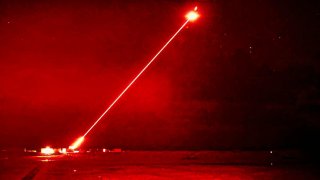NATO Navies Could Soon Be Firing Laser Weapons
Germany’s Rheinmetall and MBDA Missile Systems are partnering to develop a laser weapon system, with a focus on countering drone threats at sea. The collaboration builds on earlier successful trials aboard a German Navy frigate and aims to deliver a cost-effective alternative to traditional missiles within the next five to six years.
Summary and Key Points: Germany’s Rheinmetall and MBDA Missile Systems are partnering to develop a laser weapon system, with a focus on countering drone threats at sea. The collaboration builds on earlier successful trials aboard a German Navy frigate and aims to deliver a cost-effective alternative to traditional missiles within the next five to six years.
-Lasers offer a cheaper solution against the rising use of drones in naval warfare, promising quick deployment and low-cost interception.
-Similar projects, like Israel’s Iron Beam, highlight the growing interest in laser weapons, which could soon become a vital component of modern naval defenses.
European Defense Giants Collaborate on Laser Weapon System for Drone Defense
Two of Europe’s biggest defense firms are joining forces to deliver a laser weapon within the next five to six years. Germany’s Rheinmetall, along with the Europe-based MBDA Missile Systems, announced the agreement, adding that the company’s cooperation, “opens up new possibilities, particularly in relation to drone defense on ships.”
Creating a Laser, Together
The two companies have agreed to work together, likely to share costs, and also to share expertise. According to Rheinmetall, the industrial union will bring together two firms with, “complementary skills in the field of laser weapon technology [that] will enable them to successfully develop a military laser weapon system.”
The formal agreement is an extension of cooperation that began last year when the two firms established a set of prerequisites for the development of a military laser and began to make internal preparations.
Rheinmetall and MBDA paired up in the past, for a demonstration aboard a German Navy frigate, an F124 Sachsen-class frigate. The demonstration was a success, at least according to Rheinmetall, who boasted that the demonstration delivered on all aspects of combat effectiveness, including detection and tracking plus the interplay of sensors, command, and weapon engagement systems and effectors, possible rules of engagement.
Why Lasers?
Lasers are understood to be a cheaper, yet effective, alternative to sea-based missiles in countering drones, which are increasingly being used in an anti-ship capacity. The drones, which are cheap and relatively low-tech, have proven to be disruptive to the naval operations of sophisticated navies.
Countering the drones, which can be produced and deployed in mass quantity, with costlier- and slower-to-produce missiles, is a losing arrangement. Lasers could be the answer. Rheinmetall and MBDA believe so. The UK does also, where the DragonFire high energy laser is in development, with the prospect of offering laser rounds at a cost of only thirteen dollars USD.

“Though the promise offered by laser weapons is clear,” Breaking Defense reported, “they typically have long research and development phases, largely because of design challenges involving beam stability and power sustainment, both of which are critical to stay on target and destroy [the target].”
As the joke in defense circles goes, “Lasers are the weapon of the future, and always will be.”
But Rheinmetall and MBDA are betting they can finally make a laser weapons system work. Israel’s Rafael is also betting on a laser air defense system, the Iron Beam, which may be fielded as early as the end of 2025. According to Rafael, the Iron Beam can intercept targets at, “almost zero cost per interception” thanks to a high-energy solution that can destroy a “wide array of threats from a range of hundreds of meters to several kilometers.”
Israel tried to field a laser weapon in the past, the Tactical High Energy Laser (THEL), to intercept rockets and artillery shells. However the THEL program was canceled in 2005 on account of high costs, immobility, and poor results.
About the Author: Harrison Kass
Harrison Kass is a defense and national security writer with over 1,000 total pieces on issues involving global affairs. An attorney, pilot, guitarist, and minor pro hockey player, Harrison joined the US Air Force as a Pilot Trainee but was medically discharged. Harrison holds a BA from Lake Forest College, a JD from the University of Oregon, and an MA from New York University. Harrison listens to Dokken.
Image Credit: Creative Commons and/or Shutterstock.


